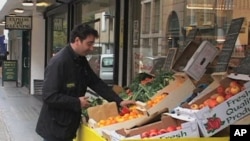Two London supermarkets are supporting the production of safe, healthy food by sourcing food locally, or growing it themselves. Food sustainability is a term primarily associated with the developing world.
The idea behind the People's Supermarket, in Central London, is to get the community involved in sustainability. Anyone can shop here, but members who pay a joining fee and work four hours a month get a discount and a say in how the store is run.
"We have been asked by members not to air freight in everything, so everything has to come from the sea," said Kate Wickes-Bull, the general manager of People's Supermarket. "So if it's not in season and you can only get it on the back of an aero plane, we don't get it."
That meant that when the store opened this past summer, there were no apples on sale, because the only ones available came from South Africa, says Wickes-Bull.
"Our aim is on fruit and vegetables, the hierarchy goes, UK, United Kingdom seasonal, then UK, European, European seasonal and then finally the rest of the world," she explained.
The direct approach ensures fair prices for farmers and also helps cut down on packing, says Andreas Georghiou, who supplies produce for the store.
"There's no packing centers, there's no pricing centers, everything comes from the farm, to the market, I collect it and bring it here," noted Georghiou.
Every year, London produces nearly three million tons of organic waste, mainly from food. This store has its own kitchen, where products too ripe to be sold are made into daily specials. John Batho is a member who cooks here.
"Cutting down on the waste, and this is the perfect way of doing it, in the kitchen," said Batho. "All this stuff would have probably just been thrown away in a normal supermarket but here it gets used."
A few kilometers away, on the rooftop of another supermarket, a different model of sustainability, a roof garden - the brainchild of Azul-Valerie Thome.
"We can collaborate between communities and supermarkets so here we're growing food and it's sold down, eight meters below in Budgens," said Thome.
The garden contains rare plant species, like yellow tomatoes and red mountain spinach. Some are sold, others are used to increase the seed diversity. The plant containers are recycled and Thome says the shop below helps with the compost.
"We use the waste from the supermarket that we bring up to our composters which we then grow food with, so it's a real circle," said Thome.
Store owner Andrew Thornton says he did not create the garden to make money.
"I suppose it is good business in saying that's what our vision is about, saying there is a different way to selling food than the mainstream supermarkets," explained Thornton.
Thorton says there are plans to install beehives in the roof garden and hold seminars and workshops to encourage more urban gardens.
"A huge part about what this project is about is about inspiring and education and about planting seeds in people's hearts," added Thorton.
Participants at both projects say they know the changes they are making are small in comparison to overall consumption and waste in London, but they hope to start habits that will help their communities understand the environmental impact of their shopping choices.




